The Magical, Unbelievable, Unbeatable Lightness of Being Sarah Ruhl
Saturday in the Arts is a weekly feature covering a trend, subject, event or personality of local interest. It runs every Saturday morning on  your site for the best entertainment and arts coverage in the area, QuadCities.com!
your site for the best entertainment and arts coverage in the area, QuadCities.com!
What if you got a call one day from a stranger saying that you won half a million dollars? Not from a lottery, but in honor of your amazing career, and the money (paid out over five years) carried no strings in how it could be spent?
Since 1981, 942 people (ranging in age from 18 to 82) have been named MacArthur Fellows – with so-called “genius grants” from the John D. and Catherine T. MacArthur Foundation, and since 2013, the amount for each is $625,000. That stratospheric prize has been earned by each of the main creators of the new opera “Eurydice” – with a libretto by Sarah Ruhl (MacArthur class of 2006), based in her 2003 play; music by composer Matthew Aucoin (class of 2018), and direction by Mary Zimmerman (class of 1998).
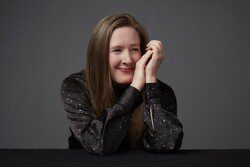
Ruhl has been a finalist for the Pulitzer in drama twice, and earned a Tony Best Play nomination for “In the Next Room.”
When Ruhl got the surprise call from the MacArthur Foundation, “it was complete elation and surprise,” she recalled in a recent interview from her Brooklyn, N.Y. home. “And I remember pushing a baby carriage down the street in the East Village and got this call from Chicago on the phone, and it was an anonymous number. I was worried immediately that my mom was in the hospital.”
Like most MacArthur winners, the grant completely transformed her young career (she was 32 at the time).
“For one thing, it made me not feel guilty about spending money on babysitters to have time to write,” Ruhl said. “So I had time to write and I think I also made a really conscious decision not to work on anything else during the time of the MacArthur that I wasn’t just incredibly passionate about, you know, I didn’t do anything because it was a paying job. Because I felt like I had this other source of income from this incredible mission to support artists. That was undergirding my life at that time.”
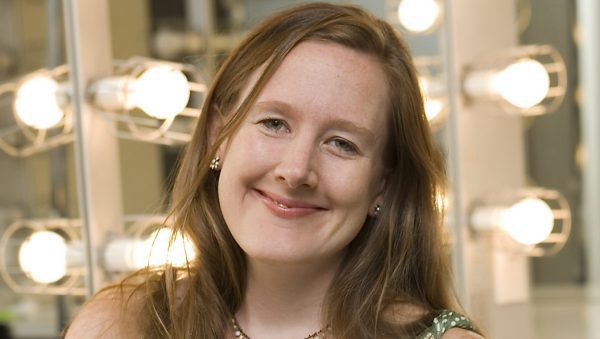
Sarah Ruhl won the $500,000 MacArthur Fellowship in 2006, when she was 32.
“I don’t think it changed how I found myself, but I do think it changed how other people saw me,” she said. “I do think it has a kind of legitimizing effect. Although I think it also puts a target on your back. I got the MacArthur relatively young…I think that’s a danger as is maybe inflated expectations from other people.”
The unrestricted funding was enormously freeing for Ruhl, who is now 47. “It’s an incredible thing to give unrestricted support to artists, and that way, I mean, I don’t know if anything else like it and I think it really helps you make a body of work,” she said.
The “Eurydice” opera — which had its world premiere in February 2020 by the L.A. Opera and will receive its Metropolitan Opera premiere Nov. 23-Dec. 16 — is of particular interest in the Quad-Cities since Ruhl has such close ties to Davenport, and the play is a love letter to her late father Patrick. A Davenport Central alum who died of cancer in 1994, at age 53, he is buried in Davenport Memorial Park. Ruhl’s mother Kathleen participated in the early years of Davenport Junior Theatre in the 1950s, graduated from Assumption High School, and participated in the title role last year of a Mississippi Bend Players virtual reading of “For Peter Pan on Her 70th Birthday,” which Sarah wrote for her, celebrating her time playing that immortal character in Junior Theatre.
“Eurydice” – based on the Orpheus myth, which includes a reference to Ruhl’s grandparents’ home in Davenport – was performed at St. Ambrose University, Davenport, in 2014, and her Tony-nominated play, “In the Next Room (or the vibrator play),” was done at Augustana College, Rock Island, in 2018. Ruhl returned to Augustana to speak in 2019, the last time she was in the Q-C.
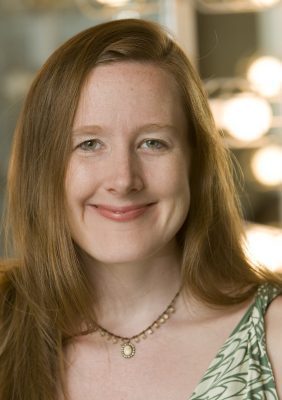
Ruhl was last in the Quad-Cities in March 2019, to speak at Augustana and work with their theater students.
A Chicago native, Ruhl received a B.A. (1997) in English and an M.F.A. (2001) in playwriting from Brown University and was a Kennedy Center Fellow at the Sundance Theatre Laboratory (2000). Her plays have been produced throughout the U.S. and Europe at such venues as the Lincoln Center Theater, New York, the Actor’s Centre, London, the Goodman Theatre, Chicago, and the Berkeley Repertory Theatre, among many others.
Kathy met her future husband, Pat Ruhl, at an Outing Club ball the summer before he started at Amherst College and she at Smith in Massachusetts.
Kathy majored in theater at Smith College, and has acted in Chicago since the mid-’60s. She taught English — after earning a master of arts in teaching from the University of Chicago — at a Catholic high school in Wilmette, and while working on a doctorate in English at University of Illinois-Chicago, taught freshman composition and English education courses. Kathy completed the PhD in 2003.
Sarah and her other daughter Kate (now a geriatric psychiatrist) were born in Chicago, and their mother would involve them in learning lines when she rehearsed. Sarah started creating stories even before she literally could write, Kathy has said.
“She said smart things even though she couldn’t write ’em down,” she said of Sarah. “In grade school, kids would always want to hear her stories first. She edited the literary magazine in high school, and did poetry and fiction.”
Sarah received her M.F.A. from Brown in Providence, R.I., where she studied with playwright and professor Paula Vogel (who won a 1998 Pulitzer for drama for her play “How I Learned to Drive.” She received the Whiting Writers Award, Lilly Award, a PEN Center award for mid-career playwrights and the $500,000 MacArthur “genius” grant.
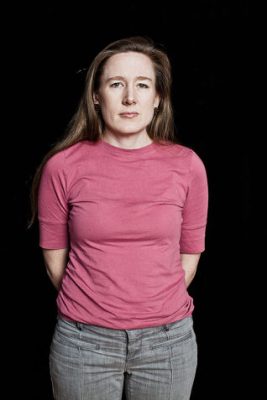
Ruhl grew up in the Chicago suburb of Wilmette, Ill., and earned her bachelor’s and master’s degrees from Brown University in Providence, R.I.
In the MacArthur citation, Ruhl was called “a fresh, compelling, and versatile playwright. In her play, Eurydice (2003), written while a graduate student at Brown University, Ruhl adapts a classic myth to modern times. Written in sparse, contemporary language, the story is told from the perspective of Eurydice and examines the power of love between husband and wife, and father and daughter. Original in tone and setting, Ruhl captures the pain of loss, the lessening of pain over time, and the necessity of forgetting. The Clean House (2004) is, by turns, humorous, delirious, and finally, poignant.
“In this quirky and surreal work, she skillfully portrays domesticity, love and sisterhood, and the search for humor at death. Another recent work, Passion Play: A Cycle (2005), is a tour de force in which Ruhl charts the politics of religion from the Elizabethan age to the Reagan era and the power across eras of faith, tyranny, and imagination,” the MacArthur Foundation said. “Additional plays by this prodigious, young dramatist include Melancholy Play (2002), Dead Man’s Cell Phone (2005), and Orlando (2003), an adaptation of the Virginia Woolf novel. This young playwright is emerging as a powerful presence in the American theater.”
Ruhl has twice been named a Pulitzer Prize finalist — in 2010 for “In the Next Room (or the vibrator play)” and in 2005 for “The Clean House.” She also received a Tony nomination for Best Play for “In the Next Room.”
Whether or not a play goes to Broadway, is really luck of the draw, Ruhl said recently.
“Whether it gets to be at the right place at the right time and I think I was lucky that ‘In the Next Room’ was able to go to Broadway, but I don’t think Tony nominations necessarily reflect the inner worth of a play,” she said.
How “Eurydice” formed and evolved
Five years after her father died (when she was 20), Ruhl wrote the first draft of “Eurydice” when she was 25, living in Providence, getting her MFA, and then finished when she was 26.
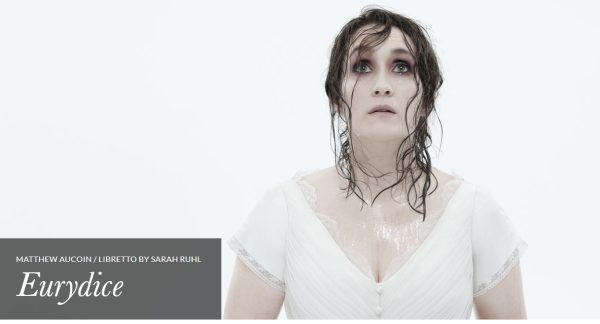
The Metropolitan Opera premiere of “Eurydice” will be Nov. 23, with a Live in HD film screening worldwide on Dec. 4.
The play was dedicated to her father. “The whole play is a letter to my father or a conversation with my father because Eurydice meets her father in the Underworld version of the play, which is a departure from the myth and there are even directions to my grandparents’ house at 111 McClellan Boulevard in Davenport, Iowa in the play,” Ruhl said recently. She said she “put little talismans or little fragments of real life” in the play. “It’s my most personal play, but it’s also a mythic play and not about me and, you know, about things much bigger than my life.”
In the play and opera, Eurydice travels to the underworld in an elevator, holding an umbrella, as it rains in the elevator.
“The water imagery is based on the river, the idea that when you go to the underworld, you cross over the river Styx and you forget your life on the way to being dead.” Ruhl said. “So in in a way, it’s in the play a symbol of rebirth and also of forgetting.”
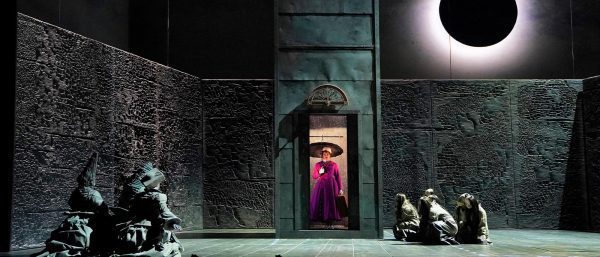
The “Eurydice” opera premiered in February 2020 at the Los Angeles Opera.
In a review of a 2007 Off-Broadway production, The New York Times wrote of the play: “In her weird and wonderful new play, ‘Eurydice,’ the gifted young writer Sarah Ruhl has adapted this mournful legend with a fresh eye, concentrating not on the passionate pilgrimage of Orpheus to retrieve his bride but on Eurydice’s descent into the jaws of death. What she finds there, and what she learns about love, loss and the pleasures and pains of memory, is the subject of Ms. Ruhl’s tender-hearted comedy…”
“The fabled creatures of ‘Eurydice’ may look like people you’ve seen on the subway, but they speak in images plucked from the blue sky of their mythic imaginations,” the Times review said. “You might almost wish there were subtitles here, alerting you to the inner meaning of the lyrical, illogical and, yes, sometimes overly quirky dialogue.”
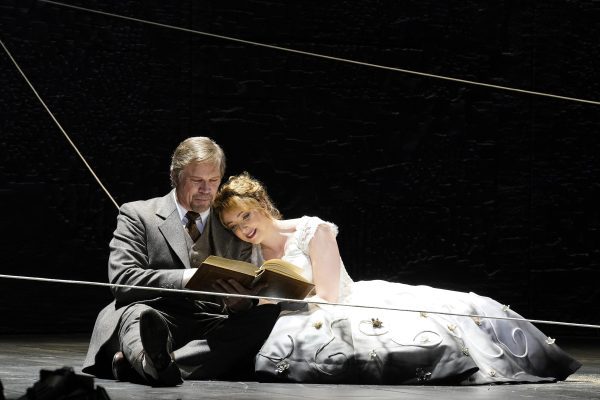
Scenes from the 2020 L.A. production of the opera.
Matthew Aucoin, a New York-based composer who won the MacArthur when he was just 28, was interested in writing an Orpheus-and-Eurydice-inspired opera, and he heard from two trusted sources that “Sarah had a singular and magical take on the myth,” he said recently by email. “Those sources were André Bishop, the artistic director of Lincoln Center Theater, and my sister Christine, who’s a true expert on contemporary theater.”
“The Orpheus myth is music’s foundational legend. This story is catnip for composers, because it makes the audacious claim that music can conquer death,” he explained. “But the story is also quite cunning: the implication is that we humans will always screw things up, that we’re not quite worthy of music. I loved the way Sarah engaged with that dynamic—especially in the way that her Eurydice is a person who’s strongly allied with words, not music, and who feels a certain distance from Orphic lyricism.”
Aucoin earned his bachelor’s from Harvard University and a Graduate Diploma (2014) from the Juilliard School. His compositions have been performed at such national and international venues as Carnegie Hall, the Salzburg Landestheater, and the Brooklyn Academy of Music, as well as the Spoleto Festival (Italy). He has conducted his and others’ works at the Los Angeles Opera, the American Repertory Theater, the Lyric Opera of Chicago, the Los Angeles Chamber Orchestra, and the Santa Fe Opera, among others. From 2013 to 2015, Aucoin was the Solti Conducting Apprentice at the Chicago Symphony Orchestra, and he has served as artist-in-residence at the Los Angeles Opera and co-artistic director of the American Modern Opera Company.
The MacArthur Foundation called him a composer “expanding the potential of vocal and orchestral music to convey emotional, dramatic, and literary meaning. A talented pianist, writer, and conductor in addition to a composer, Aucoin melds sound and language to create musical works that vividly communicate the nuances, ambiguities, and multiple meanings of texts in musical form.”
Working with Ruhl on converting “Eurydice” to an opera was largely a process of reduction, or distillation, the composer said.
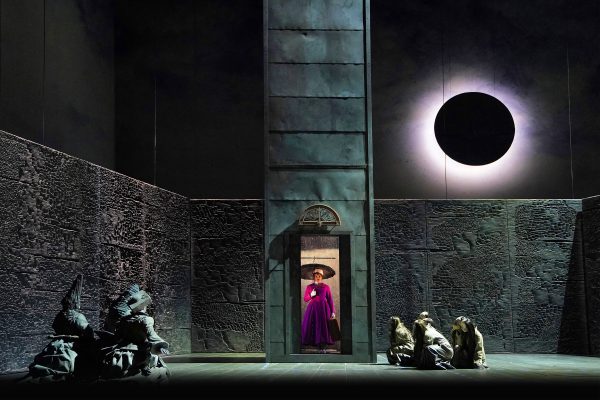
Scenes from the 2020 L.A. production of the opera
“Sarah’s language is so musical that we didn’t have to rewrite very much. And the play is relatively spare,” Aucoin wrote. “If you’re adapting a Shakespeare play into an opera, you have to cut 80% of the language, or else the opera would be ten hours long. But in the case of Sarah’s play, we probably kept more than half of the original text.” He called the process “uncannily easy and joyful.”
The Los Angeles premiere (before Covid shutdowns) was great, Aucoin said. “We had a fabulous team of singers, dancers, designers, the orchestra, everyone. But in hindsight, one thing does stand out: almost everyone in the cast got mysteriously sick at some point during the run of performances,” he said. “And remember, this was February 2020. Once the pandemic hit, the singers and I were all texting each other, wondering “did everyone maybe get covid, even before we knew it was circulating?”
There have been very minor revisions made for the upcoming Met premiere, Aucoin said.
“Sarah strikes this unique balance of being very open, very curious, a sublime collaborator and listener — and also being very grounded,” he said. “She has strong artistic principles. I think an especially important one is the emotional transparency and honesty that you find in her work. It’s a kind of emotional openness that I think takes a lot of courage, and it invited an analogous openness in my music. For that I’m very grateful.”
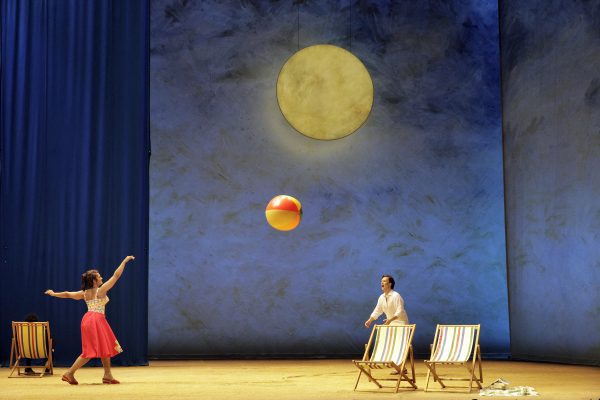
Scenes from the 2020 L.A. production of the opera
Seeing the opera “Eurydice” in L.A. was “completely overwhelming in a wonderful way,” Ruhl said. “I think there’s such a scale in opera, so you’re watching your own work kind of wash over them and, and the music and the spectacle is so much bigger than straight theater. It’s almost an out-of-body experience. I remember that same experience, the very first play of mine I saw, which is called ‘Passion Play,’ and that was at Trinity Repertory Theater (in Providence). And that was the first time I saw my play in front of an audience in three dimensions, and it’s a similar, complete completely out-of-body experience.”
Paula Vogel taught her so much about the writing life, Ruhl said.
“So much about how plays function and so much about what it is to be a human being and to be a generous person and to try to ove the artform forward by supporting younger writers,” she said. “People call her a force of nature sometimes, and she really is. She’s a galvanizing force. She’s really, she’s created a whole generation of playwrights for the American theater. She’s just incredible.”
Ruhl called herself an “opera virgin” before she did the “Eurydice” libretto, which she said is really the same play, just distilled and trimmed.
While she declined to name a favorite play, like they’re children, Ruhl said cutting down “Eurydice” wasn’t like cutting off a child’s fingers. “I’m thinking it’s more like dressing them up, you know, putting them in a new outfit, a nice new costume,” she said.
Having a Met debut in her current hometown, at an exalted, storied home for culture, is mind-boggling, Ruhl said.
“It’s crazy exciting,” she said. “My mom is coming out for the opera. It’s almost like going to a wedding, like a massive theater music wedding. The scale is so epic. And I felt like I practiced for the opening by going to ‘Fire Shut Up in My Bones,’ which is their extraordinary inaugural production after the pandemic. And I thought I’m going to need a shot of whiskey for opening night, like the scale is really quite something.”
“Fire” – a new opera with music by Terence Blanchard, that opened the Met season last month – is the first time that a Black composer and a Black librettist have found their way to the Met. “I loved it. I thought it was just gorgeous,” Ruhl said of that opera. “That was an amazing experience.”
Hollywood review and Met plans
A Hollywood Reporter review described the “Eurydice” 2020 opera beginning with a happy beach scene where Orpheus and Eurydice frolic on the eve of their marriage. Meanwhile, in the Underworld, her recently deceased father writes his thoughts to his daughter on her wedding day. His letter finds its way to Hades who uses it to lure Eurydice to his penthouse. There she suffers a fall and arrives in the Underworld via an elevator in which a rain shower washes away her memory. And so, when finally reunited with her father, she mistakes him for a porter.
“For millennia the question surrounding the myth has been, why did Orpheus look back?” the review asked. “Is he an artist so consumed by craft that he lost track of the people who give life meaning? Is he an egotist driven more by the heroic act of rescuing his beloved than by his actual love for her? Is she a muse who might fail to inspire once she’s made earthly again? Or, as Ruhl’s libretto has it, is it because Eurydice calls to Orpheus? By doing so, she raises a whole new set of questions. Why, when on the threshold of rebirth, did Eurydice choose to die a second time? Is a song, as the libretto has it, ‘two dead bodies rubbing under the covers to keep warm’? And is loss the nature of love?”
A Tony winner for 2002’s “Metamorphoses,” director Zimmerman reunites with longtime scenic design collaborator Daniel Ostling, “who provides her cast plenty of space to ponder in his sparse bardo marked by a penumbra sun and a squalid shower stall where the waters of forgetfulness rain down.,” the review said.
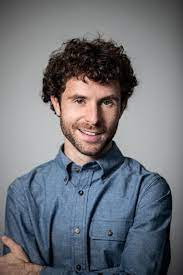
Composer Matthew Aucoin was 28 in 2018 when he won a $625,000 MacArthur Fellowship.
“Aucoin’s score is alive with emotion and musicality throughout, calling on virtuosity from every corner of the pit while also servicing the tonal shifts and emotional demands of Ruhl’s libretto. His influences appear to be everyone from Philip Glass through Richard Wagner to Gyorgy Ligeti, combining the best of each under the umbrella of his own distinctive style. Being called classical music’s wunderkind and a genius makes great the expectations surrounding Aucoin’s first big main-stage opera, which travels to the Met in New York next year. With ‘Eurydice,’ he measures up,” the review said.
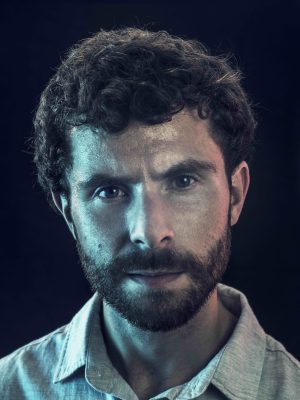
Aucoin wrote the music to “Eurydice” with a libretto by Ruhl.
A New York Times review said: “The play is meditative and surreal, fantastical and funny… Throughout this three-act opera, you sense Mr. Aucoin honorably striving to serve the play.”
The Metropolitan Opera synopsis says: “The ancient Greek myth of Orpheus, who attempts to harness the power of music to rescue his beloved Eurydice from the underworld, has inspired composers since opera’s earliest days. Brilliant American composer Matthew Aucoin now carries that tradition into the 21st century with a captivating new take on the story—a product of the Met’s commissioning program. With a libretto by Sarah Ruhl, adapted from her acclaimed 2003 play, the opera reimagines the familiar tale from Eurydice’s point of view. Yannick Nézet-Séguin oversees the December 4 transmission, leading Aucoin’s evocative music and an immersive new staging by Mary Zimmerman.”
Soprano Erin Morley sings the title role, opposite baritone Joshua Hopkins as Orpheus and countertenor Jakub Józef Orliński as his otherworldly alter-ego. Bass-baritone Nathan Berg is Eurydice’s father and fellow resident of the underworld, with tenor Barry Banks as Hades himself.
If you don’t have the time or money to actually go to the Met in New York, fortunately the opera company will show “Eurydice” at movie theaters worldwide, as part of its Live in HD series, on Saturday, Dec. 4, including Cinemark in Davenport.
Another play with Q-C references
The August 2020 Mississippi Bend Players virtual reading of “For Peter Pan on Her 70th Birthday” had to be done over Zoom because of Covid concerns. Filled with Quad-Cities references and memories of the past, Ruhl lovingly wrote the piece (which explores life, death and the allure of never growing up) for her mother, Kathleen, who’s now 78 and played the lead role in a 2017 Chicago production.
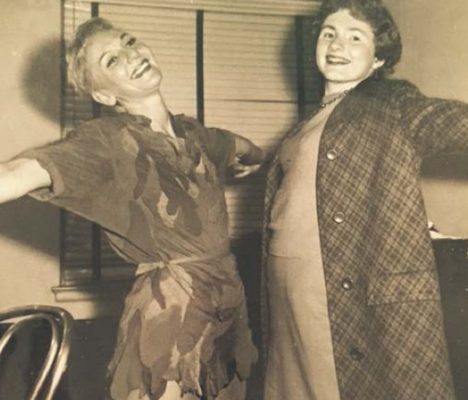
Kathy Kehoe, right, as a teenager meeting Mary Martin as Peter Pan at Davenport Junior Theatre.
Based on her mom’s experience playing Peter Pan as a teenager in Davenport, Sarah Ruhl wrote the family play, which premiered in 2016 in Louisville, Ky. She wrote about “the longing for the immortality of Neverland,” according to a play release. “Five siblings move from their father’s hospital bed to a Jameson-fueled kitchen table wake….In this world of make-believe, now seen through the eyes of these adults, there is still magic and wisdom for the young at heart.”
Shattered Globe producing artistic director Sandy Shinner said: “Sarah’s humor and unique spin on the classic tale will touch every audience member’s heart. I’m excited to surprise the audience as the intensity of the first two sections of the play transforms into a world of imagination and metaphor.”
The play premiered at Actors Theatre of Louisville’s Humana Festival, transferred to California’s Berkeley Rep, and was performed in late 2017 at New York’ City’s Playwrights Horizons. The professional summer stock Mississippi Bend Players at Augie had scheduled it (with Kathy) for July 2020, but in April had to scrap its summer season at Brunner Theatre Center due to Covid-19.
“The show was brought to me initially from Jennifer Popple and Jeff Coussens, because they had seen the show in Louisville,” Jackie McCall, MBP’s producing artistic director, said last year. “They were just really blown away by the show. Because of all the local ties in the script; because Sarah had visited campus previously, they thought it would be a strong contender, and I definitely agreed with that.”
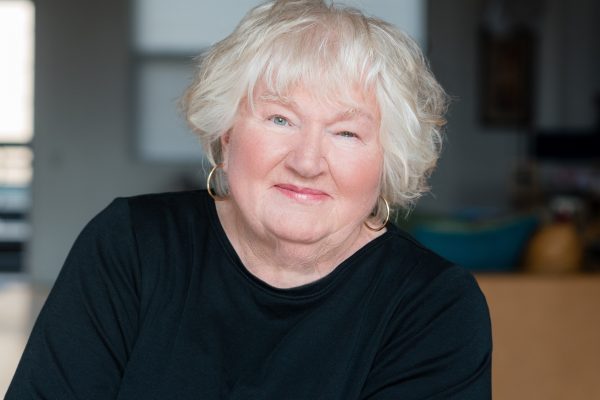
Sarah’s mother Kathleen Kehoe Ruhl is a 78-year-old native of Davenport.
The cast included Michael Carron as John, Mike Schulz as Michael, Jeanne Scurek as Wendy, and Doug Kutzli as Father. Kathy said she learned Carron as a boy was a patient of her father, a pediatrician.
“That often happens when I go to Davenport, meet someone new, and they say, ‘your dad was my doctor,’” she said. “It’s especially poignant with this play, because the play starts with my dad dying.”
Sarah said last year she was looking forward to doing “Peter Pan” at Augie, where she spoke in March 2019.
“It felt as though the play was coming home to its roots. My mother was going to perform the play a mile or two from where she grew up,” she said of MBP. “My whole extended family was going to come to town to see it. I was going to show my kids where my grandparents lived on 111 McClellan Blvd.
“It was a sad loss — of both the art and the coming together — when the production was cancelled. I was thrilled that folks were game to do an online version,” Sarah said. “And, obviously no theater losses are as big as the epic losses of lives and livelihoods that people have had during this pandemic.
“My mother grew up playing Peter Pan in the Davenport children’s theater. I grew up with a picture of her flying in green tights, and a picture of her with Mary Martin from the local newspaper,” she recalled. “I had always associated the magic of the theater with my mother flying in green tights across a stage in Davenport. The play was written for her, and for my extended family from Davenport.
“I grew up coming to Davenport at least five times a year, and the summer fireflies along the Mississippi are as central to my childhood as anything else,” Sarah said.
A glittering New Yorker profile
John Lahr, in an illuminating 2008 profile of Ruhl for The New Yorker, wrote that she “writes in a poised, crystalline style about things that are irrational and invisible. Ruhl is a fabulist. Her plays celebrate what she calls “the pleasure of heightened things.” In them, fish walk and caper (“Passion Play”), stones talk and weep (“Eurydice”), a dog is a witness to and the narrator of a family tragedy (“Dog Play”), a woman turns into an almond (“Melancholy Play”). Ruhl’s characters occupy, she has said, “the real world and also a suspended state.”
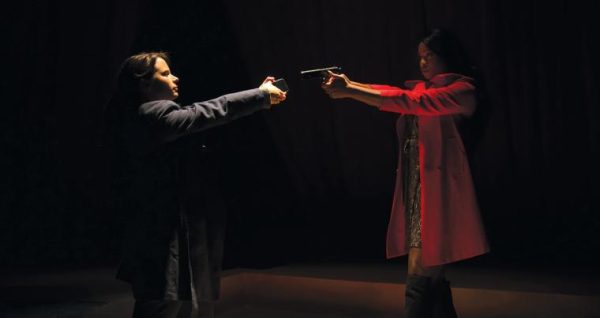
“Dead Man’s Cell Phone” was performed at QC Theatre Workshop, Davenport, in August 2018.
Her play “Dead Man’s Cell Phone” (which was done at QC Theatre Workshop) is a meditation on death, love, and disconnection in the digital age; “like her other works, it inhabits a dramatic netherworld between personal suspense and suspended time,” Lahr wrote. “Cell phones, iPods, wireless computers will change people in ways we don’t even understand,” Ruhl said then. “We’re less connected to the present. No one is where they are. There’s absolutely no reason to talk to a stranger anymore—you connect to people you already know. But how well do you know them? Because you never see them—you just talk to them. I find that terrifying.”
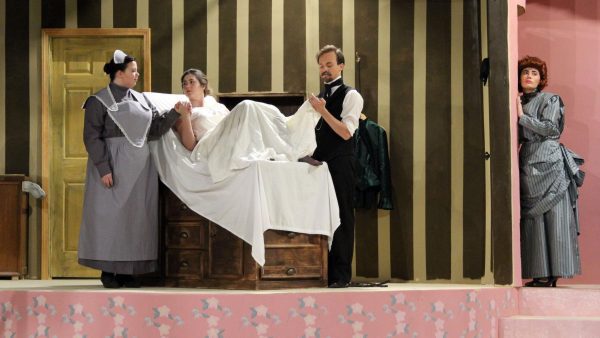
“In the Next Room (or the vibrator play)” was done at Augustana College in 2018.
“The juxtaposition of photographer and playwright—both entrepreneurs of tone and atmosphere—is one of those unconscious visual provocations that Ruhl’s plays relish,” the profile says. “I like to see people speaking ordinary words in strange places, or people speaking extraordinary words in ordinary places,” Ruhl has said. Evans wanted to project, he wrote, the “delights of seeing”; Ruhl wants to project the delights of pretense, “the interplay between the actual and the magical.” Evans once wrote about the “dream of making photographs like poems.” Ruhl began her career as a poet—her first book, “Death in Another Country,” a collection of verse, was published when she was twenty—and she sees her plays as “three-dimensional poems.”

Since 1981, 942 people have been named MacArthur Fellows, and each winner doesn’t know they’re nominated, let alone if they’ve won before they get the life-changing call.
“Ruhl, like her plays, is deceptively placid. She is petite and polite,” Lahr wrote. “Her voice is high-pitched, as if she had been hitting the helium bottle. She wears her auburn hair pinned back by a barrette, in demure schoolmarm fashion; in her choice of clothes, too, she favors an unprepossessing look—a carapace of ordinariness, forged out of her Illinois childhood and “the ability of Midwesterners to pulverize people who seem slightly precocious,” she explained. (“In third grade, somebody sent me a poison-pen letter,” Ruhl, who was bullied for being intelligent, said. “I corrected the punctuation and sent it back.”) Nothing in her modest mien indicates her steeliness, her depth, or her piquant wit. Ruhl is reserved but not shy, alert but not aggressive. She feels big emotions; she just doesn’t express them in a big way. “I had one boyfriend who really wished I would yell and scream at him,” she said. Even her laugh is just three short, unobtrusive intakes of breath.

Ruhl will do a book signing and conversation with Cynthia Nixon Nov. 10 in New Work City.
“But if Ruhl’s demeanor is unassuming, her plays are bold,” The New Yorker piece says. “Her nonlinear form of realism—full of astonishments, surprises, and mysteries—is low on exposition and psychology. “I try to interpret how people subjectively experience life,” she has said. “Everyone has a great, horrible opera inside him. I feel that my plays, in a way, are very old-fashioned. They’re pre-Freudian in the sense that the Greeks and Shakespeare worked with similar assumptions. Catharsis isn’t a wound being excavated from childhood.”
“Lightness—the distillation of things into a quick, terse, almost innocent directness—is a value on which Ruhl puts much weight,” the profile says.
“Italo Calvino has an essay that I think is profound,” she said then. “Of his defining categories—among them quickness, exactitude, visibility, and multiplicity—lightness is foremost. “In the even more congested times that await us, literature must aim at the maximum concentration of poetry and of thought,” he writes. Ruhl, in her plays, contends with the pressing existential issues; her stoical comic posture is a means of killing gravity, of taking the heaviness out of her words in order to better contend with life. “Lightness isn’t stupidity,” she said. “It’s actually a philosophical and aesthetic viewpoint, deeply serious, and has a kind of wisdom—stepping back to be able to laugh at horrible things even as you’re experiencing them.” In “Melancholy Play” (2002), a farce about suffering, Ruhl dramatized the point. Among a group of sad sacks, who are gourmands of grief—they fight over “a vial of tears”—a bank teller named Tilly causes havoc when she pronounces herself happy. “I feel lighter and lighter,” Tilly says. “I am trying to cultivate—a sensation of—gravity. But nothing helps.”
Lightness, Ruhl said, was “probably a family style.” She grew up in Wilmette, Ill., where she had “a wonderful family. I’m not like a lot of artists in that way.” Her father, Patrick, marketed toys for a number of years, a job that was a mismatch for his intellectual abilities.
“He should have been a history professor,” Ruhl said in the profile, though he loved puns, reading, language, and jazz. “I think Sarah’s appreciation of music comes from him,” her older sister, Kate Ruhl, a psychiatrist, said. “So, too, did her fascination with language. Each Saturday, from the time Ruhl was five, Patrick took his daughters to the Walker Bros. Original Pancake House for breakfast and taught them a new word, along with its etymology. (The language lesson and some of Patrick’s words—“ostracize,” “peripatetic,” “defunct”—are memorialized in the 2003 “Eurydice,” a retelling of the Orpheus myth from his inamorata’s point of view, in which the dead Father, reunited with his daughter, tries to re-teach her lost vocabulary.)
Lightness lost with a crestfallen face
The staggeringly prolific Ruhl has a new book out, “Smile: The Story of a Face,” a memoir of her struggles with Bell’s Palsy, which caused paralysis on the left side of her face.
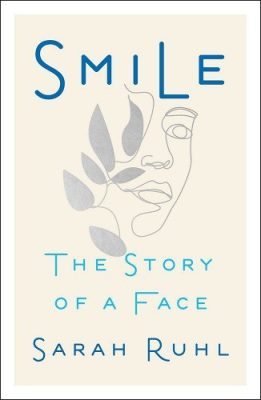
“Smile: The Story of a Face” was published by Simon & Schuster in October.
In 2010, with “In the Next Room” opening on Broadway, Ruhl just survived a high-risk pregnancy and delivered her twins when she discovered the left side of her face was completely paralyzed. She was assured that 90 percent of Bell’s palsy patients see spontaneous improvement and experience a full recovery. Like Ruhl’s own mother. But Sarah is in the unlucky 10 percent.
“And for a woman, wife, mother, and artist working in theater, the paralysis and the disconnect between the interior and exterior brings significant and specific challenges,” according to the book summary. “So Ruhl begins an intense decade-long search for a cure while simultaneously grappling with the reality of her new face–one that, while recognizably her own–is incapable of accurately communicating feelings or intentions.
“In a series of piercing, witty, and lucid meditations, Ruhl chronicles her journey as a patient, wife, mother, and artist,” the summary says. “She explores the struggle of a body yearning to match its inner landscape, the pain of postpartum depression, the story of a marriage, being a playwright and working mom to three small children, and the desire for a resilient spiritual life in the face of illness.” The book chronicles her examination of loss and reconciliation, and above all else, the importance of perseverance and hope in the face of adversity.
“There is a complex set of unspoken rules guiding women’s smiles in public,” Ruhl wrote recently for Vogue. “Without mine, I began to develop odd ways of signaling approval or friendliness. I vocalized more. I made weird gestures with my hands upon seeing people I liked. Laughing was a predicament. I could make a chuckling sound, but found it difficult to feel the correct, spontaneous sensation of belly-laughing without being able to fully open my mouth.
“I was busy finding ways to signal my internal life to my family and friends, but it was harder to negotiate meeting people for the first time. Do I explain that I’m recovering from facial paralysis? Or do I just make slightly forced gestures with my hands to communicate interest and excitement?” she wrote. “I split the difference. Sometimes I explained myself; sometimes I just made weird little waves to communicate friendliness to other parents at the playground. I felt constantly like an overenthusiastic and clumsy tourist who didn’t know the language of the country she was visiting.”
In the recent interview, Ruhl said: “It was really cathartic to write about it because I think for so long I just tried to push away the experience and not own it and not think about it,” she said. “And yet I did think about it on a daily basis, whenever I smiled at another human, being which is pretty often. Creating a narrative out of your story can be a healing thing. And, for me, writing a book was a healing experience.”
Despite her lack of control over her facial expression, Ruhl said her kids have been so supportive.

Sarah Ruhl won the $500,000 MacArthur Fellowship in 2006, when she was 32.
“What’s incredible with my kids is they’re so loving and accepting and we think a lot about unconditional love of parents for their children, but we don’t think about the reverse all that much,” she said. “I feel like my kids actually have always unconditionally loved me and accepted my smile as a smile. And it was funny because I was finishing the book and talking to my editor about it and my oldest daughter, Anna, was listening in and afterwards, I talked to her about what she heard and she said, the funny thing for me, mom, is it always felt to me like your smile or your face was a beautiful house and a wall suddenly fell down. And you kept trying to rebuild it brick by brick and you couldn’t quite, but when we looked at you, all we saw was our house, and I thought that was so beautiful and reflective of the fact that kids accept a face and love for them as it’s given.”
That’s also helped teach Anna, Hope and William that you should not pre-judge anyone based on the outward appearance, but examine and appreciate them for the content of their character, intelligence and behavior.
Ruhl’s plays (more than a dozen) have also been produced internationally and have been translated into over 12 languages, including Polish, Russian, Spanish, Norwegian, Korean, German and Arabic. She is also the author of four books: “Smile: The Story of a Face,” “Letters from Max: A Book of Friendship,” “44 Poems for You,” and “100 Essays I Don’t Have Time to Write,” which was a Times Notable Book of the Year.
Of her work, Sarah has said that she tries to “interpret how people subjectively experience life…“Everyone has a great, horrible opera inside him. I feel that my plays, in a way, are very old-fashioned. They’re pre-Freudian in the sense that the Greeks and Shakespeare worked with similar assumptions. Catharsis isn’t a wound being excavated from childhood.” She writes about fish that walk, dogs that witness family tragedy, a dead man whose cellphone won’t stop ringing, and a woman who turns into an almond.
She lives in Brooklyn with her husband Tony, a child psychiatrist who teaches a course at NYU that uses “In the Next Room” as a required reading, and her kids. For more information, visit sarahruhlplaywright.com.











